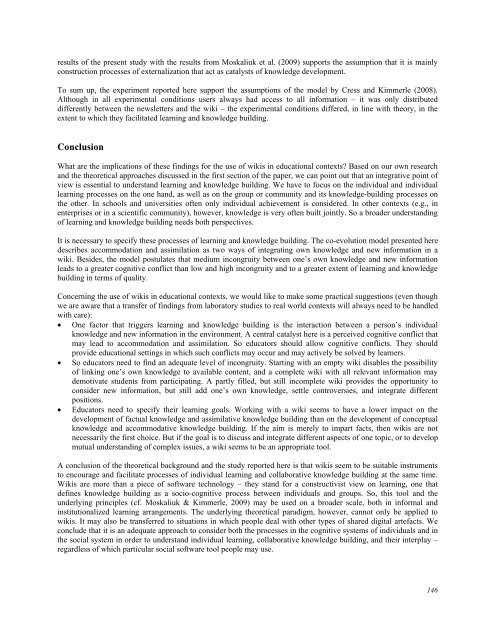October 2011 Volume 14 Number 4 - Educational Technology ...
October 2011 Volume 14 Number 4 - Educational Technology ...
October 2011 Volume 14 Number 4 - Educational Technology ...
Create successful ePaper yourself
Turn your PDF publications into a flip-book with our unique Google optimized e-Paper software.
esults of the present study with the results from Moskaliuk et al. (2009) supports the assumption that it is mainly<br />
construction processes of externalization that act as catalysts of knowledge development.<br />
To sum up, the experiment reported here support the assumptions of the model by Cress and Kimmerle (2008).<br />
Although in all experimental conditions users always had access to all information – it was only distributed<br />
differently between the newsletters and the wiki – the experimental conditions differed, in line with theory, in the<br />
extent to which they facilitated learning and knowledge building.<br />
Conclusion<br />
What are the implications of these findings for the use of wikis in educational contexts? Based on our own research<br />
and the theoretical approaches discussed in the first section of the paper, we can point out that an integrative point of<br />
view is essential to understand learning and knowledge building. We have to focus on the individual and individual<br />
learning processes on the one hand, as well as on the group or community and its knowledge-building processes on<br />
the other. In schools and universities often only individual achievement is considered. In other contexts (e.g., in<br />
enterprises or in a scientific community), however, knowledge is very often built jointly. So a broader understanding<br />
of learning and knowledge building needs both perspectives.<br />
It is necessary to specify these processes of learning and knowledge building. The co-evolution model presented here<br />
describes accommodation and assimilation as two ways of integrating own knowledge and new information in a<br />
wiki. Besides, the model postulates that medium incongruity between one’s own knowledge and new information<br />
leads to a greater cognitive conflict than low and high incongruity and to a greater extent of learning and knowledge<br />
building in terms of quality.<br />
Concerning the use of wikis in educational contexts, we would like to make some practical suggestions (even though<br />
we are aware that a transfer of findings from laboratory studies to real world contexts will always need to be handled<br />
with care):<br />
One factor that triggers learning and knowledge building is the interaction between a person’s individual<br />
knowledge and new information in the environment. A central catalyst here is a perceived cognitive conflict that<br />
may lead to accommodation and assimilation. So educators should allow cognitive conflicts. They should<br />
provide educational settings in which such conflicts may occur and may actively be solved by learners.<br />
So educators need to find an adequate level of incongruity. Starting with an empty wiki disables the possibility<br />
of linking one’s own knowledge to available content, and a complete wiki with all relevant information may<br />
demotivate students from participating. A partly filled, but still incomplete wiki provides the opportunity to<br />
consider new information, but still add one’s own knowledge, settle controversies, and integrate different<br />
positions.<br />
Educators need to specify their learning goals. Working with a wiki seems to have a lower impact on the<br />
development of factual knowledge and assimilative knowledge building than on the development of conceptual<br />
knowledge and accommodative knowledge building. If the aim is merely to impart facts, then wikis are not<br />
necessarily the first choice. But if the goal is to discuss and integrate different aspects of one topic, or to develop<br />
mutual understanding of complex issues, a wiki seems to be an appropriate tool.<br />
A conclusion of the theoretical background and the study reported here is that wikis seem to be suitable instruments<br />
to encourage and facilitate processes of individual learning and collaborative knowledge building at the same time.<br />
Wikis are more than a piece of software technology – they stand for a constructivist view on learning, one that<br />
defines knowledge building as a socio-cognitive process between individuals and groups. So, this tool and the<br />
underlying principles (cf. Moskaliuk & Kimmerle, 2009) may be used on a broader scale, both in informal and<br />
institutionalized learning arrangements. The underlying theoretical paradigm, however, cannot only be applied to<br />
wikis. It may also be transferred to situations in which people deal with other types of shared digital artefacts. We<br />
conclude that it is an adequate approach to consider both the processes in the cognitive systems of individuals and in<br />
the social system in order to understand individual learning, collaborative knowledge building, and their interplay –<br />
regardless of which particular social software tool people may use.<br />
<strong>14</strong>6

















